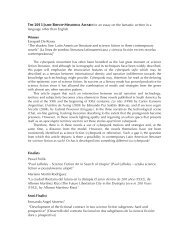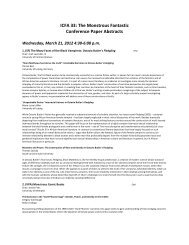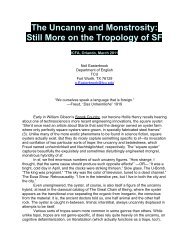The Monstrous Fantastic Conference Paper Abstracts - International ...
The Monstrous Fantastic Conference Paper Abstracts - International ...
The Monstrous Fantastic Conference Paper Abstracts - International ...
Create successful ePaper yourself
Turn your PDF publications into a flip-book with our unique Google optimized e-Paper software.
134. (F/SF)<strong>The</strong>oretical Building-Blocks of Fantasy Captiva BChair: Robert von der OstenFerris State UniversityStrategies of Folklore in Fantasy LiteratureTimothy H. EvansWestern Kentucky UniversityMany writers of fantasy draw on folklore, but they do so for a variety of reasons. Folklore can be a source of content, forms, ideas or settings,and a kind of literary strategy. My paper will begin by offering several definitions of folklore. I will then survey four major strategies for usingfolklore in fantasy literature, giving examples from the work of English language fantasy writers from the 20 th century. <strong>The</strong> four strategies are:1) <strong>The</strong> use and manipulation of specific elements from folk narratives, especially folktale types and motifs, either in a straightforward way orreshaped in ways that challenge readers’ expectations. Examples include literary fairy tales by Angela Carter and Jane Yolen. 2) <strong>The</strong> use ofethnographic models and invented “folklore” to create realistic invented cultures, which then may be used to explore a variety of cultural,philosophical and moral issues: an example is Ursula K. Le Guin’s Always Coming Home. 3) <strong>The</strong> use of traditional beliefs and legends (forexample, medicinal or magical beliefs, or supernatural legends) to explore the constructed nature of reality: an example is the short stories ofJewish-American writer Avram Davidson. 4) <strong>The</strong> mixing of actual and invented “folklore” to create a sense of authenticity for the author’sideology: works by H. P. Lovecraft and Neil Gaiman are examples. <strong>The</strong>se four strategies are not mutually exclusive. Together, they give writersan effective way to subvert their reader’s sense of reality, or of moral order (or both), by using the familiar (folklore) to explore the unreal.<strong>The</strong> Psychological Epistemology of the <strong>Fantastic</strong>Stacie L. HanesKent State UniversitySociology and psychology recognize the importance of story, but the social sciences have traditionally been considered “soft” science, whilephysics, chemistry, and biology are “hard” sciences; however, advances in medical sciences over the past twenty years, especially such fields asneurobiology, increasingly indicate that cognitive psychology and its siblings are based on and supported by bedrock biology and chemistry.Some psychoanalysts hold the line that biology will always be irrelevant to psychology, or at least psychoanalysis—a more radical version ofFreud’s late nineteenth-century view that biology was not sufficiently advanced to be of much help in psychoanalysis. Other psychologistsbelieve that this hermeneutic view (as opposed to what Eric Kandel calls the scientific view), which resists combining ways of thinking about themind with ways of thinking about the brain, clinging to the mind-body divide, has held back the fields of psychology and psychoanalysis fromadvancing intellectually. Kandel writes that one issue “deserves a more detailed answer, and that relates to whether biology is at all relevant topsychoanalysis. …this issue is so central to the future of psychoanalysis that it cannot be addressed with a brief comment. I therefore havewritten this article in an attempt to outline the importance of biology for the future of psychoanalysis” (505). In sum, biology is critical tounderstanding the human mind, and Kandel goes on to detail how and why. <strong>The</strong> plain conclusion, then, is that biology and literature--especiallyfantastic literature--are inseparable, or rather that they should be.Immersion vs Estrangement: Fantasy, Science Fiction and Cognitive Literary <strong>The</strong>oryMerja PolvinenUniversity of HelsinkiMany of our most basic assumptions concerning the experience of fiction are rooted in notions such as life-like worlds and believablecharacters, which describe the general sense of verisimilitude that fictional texts give to their readers. But it may be that such notions obscurethe way in which engaging with a work of fiction – however life-like – still is a coupling of mind with a crafted representation of unreal worlds,events and beings. In cognitive literary studies, readers’ engagement with fiction has largely been seen in terms of an immersion in a life-likefictional world – a feeling of transportation that is understood specifically as an emotional engagement with the characters and events. Thatemotional connection has, for its part, often been theorised in terms of temporary belief or constructed illusion, with the central assumptionthat awareness of the fictionality of fiction is an obstacle to the immersive experience. But how convincing are such theories when they arefaced with science fiction and fantasy, genres which can create both emotionally immersive and cognitively estranging effects? Thispresentation introduces the central theories of immersion and engagement in cognitive literary theory, and proceeds, with reference to theworks of Christopher Priest, China Miéville and Jeff VanderMeer to show the problems they encounter when applied to speculative fiction. I willargue that the analysis of the narrative effects of SF show that our general understanding of imaginative engagement with fiction must developways to accommodate a more nuanced interplay between emotional immersion and estrangement.*******





